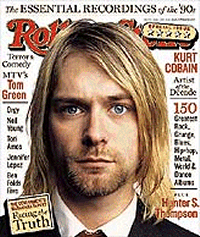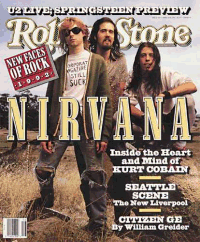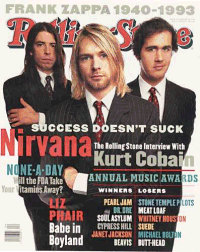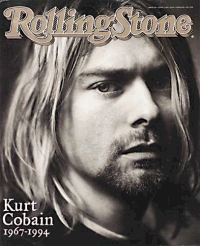|
Kurt Cobain ARTIST OF THE DECADE BY GREIL MARCUS
|
|
| If you look back over the last ten years, you can, if the notion appeals to you, choose an artist who most shadows these times: the Coen brothers, Oliver Stone, David Lynch, Bill Pullman or Jim Carrey in the movies, Mike Judge on TV, Tupac Shakur as an icon in the life-proves-art game, Dr. Dre, Puff Daddy or Master P as entrepreneurs and empire builders, Bill Clinton as fast-talking, slow-walking, good-looking Mohair Sam. You can regret those who had a chance to speak in a new voice and lost it, or simply let it go: the Geto Boys, Snoop Doggy Dog, Sinead O'Conner. I could make a better case for the music of PJ Harvey, the Pet Shop Boys, Corin Tucker in Heavans to Betsy and Sleater-Kinney, or even Bob Dylan or David Thomas or Pere Ubu- but if Kurt Cobain, speaking through Nirvana, had done nothing but write and record "Smells Like Teen Spirit" and make it hit, he might still be a step ahead, even though he left the decade to its own devices before it was half over. |

|
|
" The drama played out in Kurt Cobain's preformance was a drama of surplus population, be it that of a solitary nobody who nobody liked or a generation the economy didn't need and the culture didn't want. " --Greil Marcus |
A decade, afer all, is nothing more than a piece of commodified time, moments erased and reshaped into somethng an infinate number of people can persude themselves to buy simultaneously. "Life is pretty cheep/It's sold a decade at a time," as the San Fransico punk band Flipper once put it.
In the time he took, Cobain used the decade up- and in a sense "Smells Like Teen Spirit" used his music up even as it announced it. You can hear every other song Nirvana made in what this one song asked for, in what this one song was convinced it would never get. From the first time they heard it, and every time afterward- in the two and a half years between the tune's entry into the chards, in fall 1991, and Cobain's suicide, in the spring of 1994, and in the five years since- more people than myself or maybe you have felt the chill of the slow, transparent, chiming notes of "Smells Like Teen Spirit." You hear all that is lucid, simple and unrushed- a between-past-and-future suspension of time lovely enough to convince you that the world itself has paused to listen- pulling against the deperation and hurry of everything else in the preformance, and everything else that finally sucks up those brief prophecies of clarity and wipes them out. Still, those silken notes hang in the air, a mourning for the failures of the past, a suggestion of a future to be made or lost, a sense of starting over stopped in its tracks, remaining as an echo that rebukes you for your own failures. The song is big, loud, ambitious, thrilling, definitively unsettling and a definitive release, with the singer as sure of what he means as he is that it's a waste of time to try to explain it to anyone who might hear him. Then why does he bother? Because, as the Coasters put it a decade before Cobain was born, "this is rock & roll." |
|
In the world called up in "Smells Like Teen Spirit," there was room for small, quiet, perfect Nirvana tunes like "Something in the Way" and huge, rolling screams like "Tourette's," for sterile manifestoes like "Serve the Servents" and fabulous shaggy-dog stories like the band's bootleged cover of the Doors "The End" (the Oedipal tragedy here is set entirely in a Belgian waffle house)- room, in other words, for anyone who felt the song stake its claim to a moment in insisted couldn't last. "A denial! A denial! A denial!" Cobain said as he ended the song, in a voice that tested the body more than the soul, over and over, again and again: "A denial! A denial!" Of what? Of what you want most, of what you know you can't have. But the song says, if you have something as good as this, why can't you have what you want most?
There is great, whole drama taking place in Nirvana's music, a drama that holds his shape, a drama that is also small and odd, a drama with costumes but not masks. Kurt cobain plays all the roles here; band mates Krist Novoselic and Dave Grohl are the chourus, standing off to the side, free to comment on the action but no implicated- positioned, as the drama hits its notes and runs is course, neither reap the glory for the deeds performed nor pay for the crimes enacted. |

|
"The most anti-authority guy in the band is Kurt. The most anti-authority guy I know is Kurt. He'll be the one to walk up to people and scream 'Why? Why? Why?' A lot of times I'll understand the reason behind things, even if I don't agree with it. Kurt's the guy out there yelling at the top of his lungs." --Krist Novoselic |
You can see it in the opening and closing footage of Kevin Kerslake's 1994 video documentery, Live! Tonight! Sold Out!!. with Cobain appearing onstage in chopped reddish hair, a scruff of beard o his chin, a cigarette in his mouth, wearing nothing but a grossly overstuffed Fredrick's of Hollywood-style black slip. Behind the drum kit, Grohl is stripped to the waste except for a black bra; six-foot-six-inch Novoselic is literally the straight man, a telephone pole with short hair and a Kmart cotton shirt hanging out of his pants. This is true grunge: not as some music-business catch phrase, but as dirt. The self-portrait Cobain presents is vaguely repulsive before it's anything else: before it's silly, the ultimate fulfillment of the Beavis and Butt-head dream that Nirvana acted out better than any other band; before it's disturbing; before you dismiss it with a laugh or scratch at it under your skin.
Grohl and Novoselic look funny here, like they're having a good time, amused with the show. On Cobain's face, and in the way he holds his body- if it's even his anymore- is an unreadabe, unstable smear of sarcasm and lef-loathing, a cheap joke on the audience presumed gender politics and an absolute refusal of the things they are. Cobain offers male as female, rapist as rape victim, prom queen as the ugliest girl in school ("People just left me alone," Cobain told the Bristish writer Jon Savage in 1993. "They were afraid. I always felt as if they would vote me Most Likely to Kill Everyone at a High School Dance"), guitar hero as cultural terrorist, pop star as star of a bad dream you'd be ashamed to have, let alone suspect the star himself of having, the THIS WAY OUT of the band's biggest hit was always availible really the end of every song: Oh well, whatever, never mind. At then end of this particular concer, at the end of the film, Cobain, his slip now more of a film of grime on his skin than a garment, his eyes all dark and seeing something you're not seeing, crawls off stage on his hands and knees like an animal. |
|
The drama played out in Cobain's preformances was a drama of abjection and abasement, of worthlessness and redundancy, of drama of surplus population, be it that of a solitary nobody who nobody liked or a generation the economy didn't need and the culture didn't want. "Raised in a home with six baby boomers, all I ever set out to do was find out why I felt so different," Gael Fashinbauer Cooper wrote in Minneapolis' City Pages, in a readers fourum published just after Cobain's death. "I celebrated their past through every trivia game and hundreds of history books, and one day it occured to me that, however short is is, I might have a past of my own. Nirvana spoke to that, even if they had lives that were way more messed-up than your own, even if you never liked them."
This drama, an acting out of the truth that you can make your own history, that you have to, was taken to the extremes- in the screams out of Cobain's throat you couldn't gainsay as effects, in the band's punk war against its own success. More commercially successfull than any other punk band, Nirvana were also the band most infected by the folk virus: the suspicion that if what you do is accepted by a mass audiance, then it must be either devoid of content or a sellout, and you yourself the enemy you mean to destroy. |
"I'm a spokesman for myself. It just happens that there's a bunch of people that are concerned with what I have to say. I find that frightening at times because I'm just as confused as most people. I don't have the answers for anything. I don't want to be a fucking spokesperson." --Kurt Cobain |


|
And yet the band made great drama out of something as puerile as this- a doctrine inherited less from Johnny Rotten than Pete Seeger. There is a sequence in Sold Out!! when, though the milky, indistinct tones of what seems to be a tenth-generation bootleg dub of "Love Buzz," as preformed somwhere in South America, you see Cobain dive off a low stage into the crowd, which is pressing against the stage as if it's bellying up to a bar. A guard roughly pulls Cobain back, then smashes him in the head and knocks him down. As Cobain pulls his arms and legs into his chest, the guard stomps him. This wasn't staged, it was real- and yet there is a way in which this event was staged, becuase it was always present in the music. The glimpse you are given of the man inside the publicity, a defenseless loser named Kurt Cobain, inside a star who merely happens to have the same name- something the thug in the guard has suddenly glimpsed, and just as suddenly acted upon- is shocking.
But it's not as shocking as a Sold Out!! clip from The Jonathan Ross Show, apparently a U.K. TV variety program. A smiling Ross announces Nirvana and "Lithium," musically a relatively moderate number in the group's repertoire; the band appears and, on this pleasant, orderly show, on a small, neat set, plays a harrowing version of "Territorial Pissings" instead. The band completely explodes the context- which means as you watch, nothing fits. More than that, what you're seeing is in some absolute way not right. Every sound, every gesture, is wild, rough, and scraping: scraping the paint right off the walls and your knowledge that, in a setting such as this, everything is ritualized, right out of your head. Even as you watch, you can't imagine that this was ever on TV. It's too strong, the song too far outside itself, the musicians too far outside of themselves, the preformance too far outside any rules for it to be brought back into the strictness of expectation and result, for it to be returned to the frame of reference on which entertainment rests. This, too, is shocking- and because this is a play, staged inside the little theater of the TV show, its reality is paradoxically far more complete than the real-time event of the guard attacking the performer. The shock is total: a denial, and as a denial, a violation, someone killing everyone at a highschool dance, yourself included, no matter how much you say you like the song. |
| "Nirvana was about our distrust and dependance on popular culture," wrote Darin Smith of St. Paul, another contributor to the City Pages forum. "We hate it because it's shallow, sentimental and dishonest. There are more points of similarity between Mariah Carey and Eddie Vedder than there are differences. I wear the same dumb stare when I put my Walkman on.. Kurt didn't offer any solutions, he just railed against the ugliness and made it his home. We got a cheap thrill from celebrating our wrechedness with him. He wasn't brilliant or all that articulate, but I like to scream along. He doesn't want to be my voice, and I know there's nothing healty about singing 'Rape Me' every day on the way to work, so maybe it's best that he's gone. Or maybe 'Rape Me' will feel even more compelling now." It does: So many of Cobain's last songs were draped in a curtain of noise, but today that curtain hides nothing. All the demands in the music- the demand to be heard, to be left alone, to come as you are and leave when you choose- stand out clearly, and all of those demands remain unstatified. |
Want more?
Check out www.rollingstone.com, for "The Essential Recordings of the 90's," the cover strory of this issue.
|